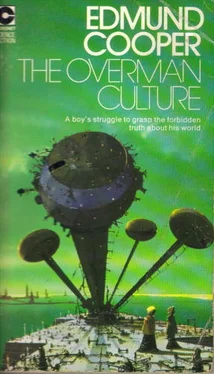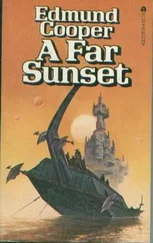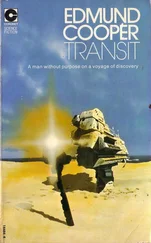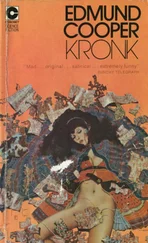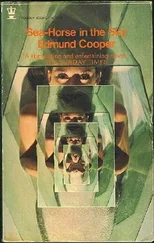Edmund Cooper - The Overman Culture
Здесь есть возможность читать онлайн «Edmund Cooper - The Overman Culture» весь текст электронной книги совершенно бесплатно (целиком полную версию без сокращений). В некоторых случаях можно слушать аудио, скачать через торрент в формате fb2 и присутствует краткое содержание. Город: London, Год выпуска: 1977, ISBN: 1977, Издательство: Coronet Books, Жанр: Фантастика и фэнтези, на английском языке. Описание произведения, (предисловие) а так же отзывы посетителей доступны на портале библиотеки ЛибКат.
- Название:The Overman Culture
- Автор:
- Издательство:Coronet Books
- Жанр:
- Год:1977
- Город:London
- ISBN:978-034017860
- Рейтинг книги:5 / 5. Голосов: 1
-
Избранное:Добавить в избранное
- Отзывы:
-
Ваша оценка:
- 100
- 1
- 2
- 3
- 4
- 5
The Overman Culture: краткое содержание, описание и аннотация
Предлагаем к чтению аннотацию, описание, краткое содержание или предисловие (зависит от того, что написал сам автор книги «The Overman Culture»). Если вы не нашли необходимую информацию о книге — напишите в комментариях, мы постараемся отыскать её.
The Overman Culture — читать онлайн бесплатно полную книгу (весь текст) целиком
Ниже представлен текст книги, разбитый по страницам. Система сохранения места последней прочитанной страницы, позволяет с удобством читать онлайн бесплатно книгу «The Overman Culture», без необходимости каждый раз заново искать на чём Вы остановились. Поставьте закладку, и сможете в любой момент перейти на страницу, на которой закончили чтение.
Интервал:
Закладка:
“No, I’m not. But Horatio is. I was too busy with the map. Horatio is positive we were followed. He says that one drybone stayed with us for about six streets, then another took over, and then another.”
“Did Jane notice anything?”
“She thinks we might have been followed, but she is not sure. Horatio said the drybone was always about a hundred paces behind us. He made Jane take a rest and stay behind a bit until one of them passed. Then she followed the drybone. But Horatio says that when we turned into another street the drybone disappeared and another took over. Jane did not see the switch.”
“Just assuming you were being followed, what made Horatio think they were drybones and not fragiles?”
Ernest smiled faintly. “As you know, drybones are Horatio’s special study. I can’t tell them at a distance, but Horatio seems to be able to, even when he can’t see their hair. I don’t know how he does it, but I have seen him identify drybones and fragiles correctly in a group quite far away.”
“We had better assume the worst, then. You were followed, and at least one drybone knows that you found the library—if it is a library.”
“Were you and Emily followed?”
“I don’t think so. No. I’m sure we weren’t. We were really alone, especially in the open country…. I wonder if the drybones thought you were being systematically curious or just idly curious.”
Ernest thought for a moment or two. “They must have known that I was drawing a map.”
“You could have been sketching interesting pieces of architecture.”
“I don’t think they would fall for that.”
“I don’t either. But they might. Still, if we spend our time worrying too much about what the drybones know or suspect, we’ll never get anything done. We must just proceed as if all is well until somebody stops us.”
“Or takes us into protective custody,” added Ernest. “Just like the Gestapo.”
Michael stared down at the water once more. “It isn’t a river but it flows.” Suddenly he laughed. “I like that. I like it very much. Splendid attention to detail…. Well, I suppose it is time we went home and behaved normally—in the faint hope that we are deceiving somebody.”
“What is the next project?” asked Ernest.
“You found London Library, but we don’t know if it contains any books. So, Ernest, we will just have to see.”
“So soon? The drybones will expect us to go back.”
“Also part of the project,” said Michael grimly. “A test case, if you like. I expect the drybones will expect us to go back.”
14
It was late evening. Mother and Father and Michael had just returned from the cinema. They had been to see Gone with the Wind. Mother had made hot milk drinks. Michael was sipping his slowly.
“You must get to bed soon, Michael,” said Father. “It has been a long evening. Then you will be fresh for school tomorrow. Did you enjoy the film?”
“Yes, Father. It was very good…. Was there really a war between the North and South in America?”
“I just love Vivien Leigh,” said Mother. “She is such a great actress. Mind you, she had a perfect match in Clark Gable. What a handsome pair they were.”
“Was there really a civil war?” persisted Michael.
Father took a drink of milk, although Michael still found his far too hot. Mother and Father never seemed to notice when food or liquids were too hot to eat or drink.
“Well, now, that is an interesting point,” said Father. “Of course, you have to remember that films are only dramatic entertainment. They are concerned with emotions rather than facts. Every nation has had a civil war at some time, I suppose. Probably the Americans did.”
“But you don’t know.”
“Son, you must realize it is not possible to keep in mind everything that has happened. The important thing is to remember important things—things that matter in your own personal life.”
Michael sighed. That was the way it always went, either by a long or a short route. Suddenly he decided to try a surprise attack.
“Does the Thames flow down to the sea?”
“What a question! Michael, I think you are tired. It is time for bed. You ought to know that rivers flow to the sea.”
“That wasn’t what I asked. Does the Thames flow to the sea?”
“Now you are being difficult. I have just told you that rivers flow to the sea.” There was a note of irritation in Father’s voice. Michael recognized it. Always the same note of irritation—a few minutes before conversational cutoff, a display of anger, or a display of contempt.
But Michael went on.
“Is the Thames a river?”
“Dear boy!” The exasperation mounting. “I sometimes despair. You know what the Thames is as well as I do. Sometimes I think you try to annoy me intentionally with silly questions. Come on, it is time for bed. Let us not have a bad end to a pleasant evening.” Father finished his milk and stood up.
So it always went. So it always would go. Unless somebody did something about it.
“I have another silly question,” said Michael shrilly. “How was I made?”
Mother said: “Michael, it is very late. Let us go to bed, and leave these questions till tomorrow, when we are fresh.”
Michael glared at her. “The standard response. Wait till tomorrow. Wait till you are old enough to understand. Wait! Wait! Wait! I have done a long stint of waiting. All my life so far. I’m half out of my mind with waiting. Perhaps that is what you want.”
Father was stern. “I will not have you speaking to Mother like that. Apologize at once, boy!”
“What will you do if I don’t—beat me? I’m a bit big for that, but drybones are stronger than fragiles, so I suppose you could do it.”
Father seemed surprised. Oddly, there was less anger in his voice. “What is all this nonsense about drybones and fragiles?”
Michael knew he was being reckless, but he didn’t care anymore. The years of deceit, the years of frustration and ignorance had built up a great pressure inside him. He had to reduce the pressure somehow. He took a deep breath.
“You are a drybone, I am a fragile. Silly definitions, perhaps, but we had to find some way of describing the difference. You people have kept us in ignorance as far back as I can remember. It looks to me as if you intend to keep us ignorant and dependent forever. But that is something I will not stand. You can do what you like, but you cannot make me accept a condition of ignorance.” He paused, trying to discern some expression in their faces, but there was only a curious blankness.
“I know you drybones are superior to us fragiles,” he went on desperately. “We bleed, you don’t. We can be hurt easily, you can’t. We get tired, you have inexhaustible energy. We feel pain, you don’t. There are so many differences. And yet you say you are my father and mother. So I say to you: How was I made?”
Mother sighed. “Michael, you make things so difficult. Be a good boy, and wait until morning.”
“How was I made? How was I made? How was I made?” Michael did not know that he was shouting.
Father sat down once more. “Well, boy, it sounds as if you are determined.” The anger had drained from his voice. “I like determination in a man. It shows he has character…. I’ll speak plainly. You think we have been misleading you. Has it occurred to you that we may have been shielding you, protecting you?”
“Yes, it has occurred to us that you may be protecting us,” said Michael wearily. “But if so, it is like—like mental suffocation.”
“You want to know how you were made. I’ll tell you. You were grown from a tiny speck of life—call it an egg…. Michael, can you remember back to when you were very small?”
Читать дальшеИнтервал:
Закладка:
Похожие книги на «The Overman Culture»
Представляем Вашему вниманию похожие книги на «The Overman Culture» списком для выбора. Мы отобрали схожую по названию и смыслу литературу в надежде предоставить читателям больше вариантов отыскать новые, интересные, ещё непрочитанные произведения.
Обсуждение, отзывы о книге «The Overman Culture» и просто собственные мнения читателей. Оставьте ваши комментарии, напишите, что Вы думаете о произведении, его смысле или главных героях. Укажите что конкретно понравилось, а что нет, и почему Вы так считаете.
